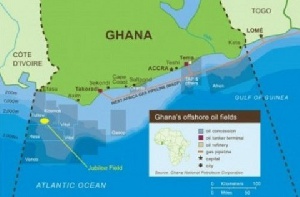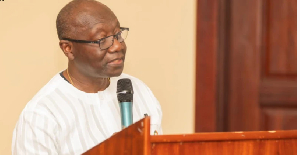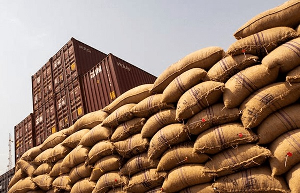Ghana’s Attorney-General and the Minister of Justice, Gloria Afua Akuffo is leading a Ghanaian delegation to witness the delivery of judgement in the maritime boundary dispute between Ghana and Cote d’Ivoire on Saturday, September 23, 2017.
Officials from the Ministry of Energy, the Attorney-General’s Department, the Maritime Boundary Secretariat, the Ghana National Petroleum Corporation (GNPC) and other state agencies that made an input into the hearing of the case are also in Hamburg to observe proceedings.
The Ivorian team, the Daily Graphic gathered, are expected in Hamburg Today, September 22, 2017.
According to the Daily Graphic report, officials from both countries are tight lipped on their expectations but a Ghanaian source said “we hope for the best from the tribunal.”
The International Tribunal for the Law of the Sea (ITLOS) will on Saturday, September 23, 2017 deliver its judgement on the maritime boundary dispute which has been pending before it since 2014.
The two countries have laid claim to the disputed boundary in the Atlantic Ocean and are both calling on the Special Chamber to hold in their favour.
Cote d’Ivoire is praying the tribunal to declare that Ghana has moved into its maritime boundary but Ghana is requesting the tribunal to reject Cote d’Ivoire’s claims and maintain the status quo, which had been respected by both countries for more than four decades.
A press release, dated September 6, 2017 and issued on the website of the ITLOS said “the Special Chamber of the International Tribunal for the Law of the Sea, constituted to deal with the dispute concerning delimitation of the maritime boundary between Ghana and Côte d’Ivoire in the Atlantic Ocean (Ghana/Côte d’Ivoire), will deliver its Judgment at 11 a.m. on Saturday, September 23, 2017.
“The Judgment will be read by Judge Boualem Bouguetaia, President of the Special Chamber,” the release added.
Hearing of the merits in the dispute concerning the delimitation of maritime boundary between Ghana and Cote d’Ivoire came to an end on February 16, 2017 after two weeks of legal tussle between the two countries. The hearing of the merits began on February 6, 2017 and ended on February 16, 2017.
Both countries, with the help of local and international lawyers, advanced legal and technical arguments in their bid to convince the tribunal to hold in their favour.
Ghana’s closing address:
Ms. Akuffo, on Monday, February 13, 2017, officially ended Ghana’s oral arguments and asked the tribunal “to reject Cote d’Ivoire’s attempts to argue that an oil field built up and developed over decades should have been abandoned overnight in 2009 when Cote d’Ivoire decided that a different boundary would suit it better. The cynicism here is all that of Cote d’Ivoire, I am afraid to say, not of Ghana.”
She prayed the Special Chamber to apply well-established legal principles to a clear and consistent body of evidence.
Ghana is accordingly praying the Special Chamber to declare that Ghana and Cote d’Ivoire mutually recognised, agreed and applied an equidistant-based maritime boundary in the territorial sea, EEZ and continental shelf within 200 miles.
Ghana is pleading with the Chamber to hold that the maritime boundary in the continental shelf beyond 200 miles follows an extended equidistance boundary along the same azimuth as the boundary within 200 miles to be the limit of the national jurisdiction.
Further to that, Ghana wants the Special Chamber to hold that Cote d’Ivoire was in accordance with international law, being estopped from objecting to the agreed maritime boundary.
Another order being sought by Ghana is a declaration that “the land boundary terminus and starting point for the agreed maritime boundary is at Boundary Pillar 55 (BP 55).”
Besides, Ghana says the Chamber should hold that “the customary boundary between Ghana and Cote d’Ivoire in the Atlantic Ocean starts at BP 55, connects to the customary equidistant boundary mutually agreed by the parties at the outer limit of the territorial sea, and then follows the agreed boundary to a distance of 200 M. Beyond 200 M, the boundary continues along the same azimuth to the limit of national jurisdiction.”
Again, Ghana is asking the Special Chamber to reject Cote d’Ivoire’s claim that Ghana violated the Special Chamber’s April 25, 2015 order as well as claims that Ghana violated Article 83 of the United Nations Convention on the Law of the Sea (UNCLOS) and Cote d’Ivoire’s rights.
Article 83 of UNCLOS, 1982 borders on agreement between states with opposite or adjacent coasts on delimitation of customary boundary lines based on agreement on the basis of international law to achieve an equitable solution.
Ghana also denied claims by Cote d’Ivoire that Ghana was not co-operating.
According to Ghana, a vast area of land offshore had not been touched because of the provisional measures and expressed regret that Cote d’Ivoire had not shown why it alone should be exempted from paying compensation to Ghana should it (Cote d’Ivoire) lose the case.
Cote d’Ivoire’s request:
Making a case for Cote d’Ivoire, a former Minister of Petroleum, Adama Toungara, told the tribunal to reject Ghana’s requests and claims and rather declare and adjuge that the sole maritime boundary between Ghana and Cote d’Ivoire follows 168.7 degrees azimuth line, which starts at BP 55 and extends to the outer limit of the Ivorian continental shelf.
Cote d’Ivoire is also urging the tribunal to hold that Ghana’s unilateral activities in the Ivorian maritime area constitutes a violation of the exclusive rights of Cote d’Ivoire over its continental shelf as well as its obligation to negotiate in good faith.
Ghana’s neighbour also wants the tribunal to hold that Ghana violated the tribunal’s April 25, 2015 provisional measures.
Cote d’Ivoire further wants the tribunal to invite the parties to carry out negotiations in order to reach an agreement on the terms of the repatriation due Cote d’Ivoire.
In the alternative, Cote d’Ivoire says in the event that the two countries are not able to reach an agreement within six months after delivery of the judgement, the Special Chamber “will determine those terms of reparation on the basis of additional written documents dealing with this subject alone.”
Panel:
The President of the Special Chamber constituted to hear the case is Judge Boualem Bouguetaia.
Other members of the panel are Judges Rüdiger Wolfrum Germany and Jin-Hyun Paik, Republic of Korea.
Ad hoc judges Thomas Mensah from Ghana and Ronny Abraham, France, were selected by Ghana and Cote d’Ivoire respectively per the rules of the ITLOS.
The registrar of the Special Chamber is Mr Philippe Gautier.
Background:
After 10 failed negotiation attempts, Ghana in September 2014 announced it had instituted arbitration proceedings at ITLOS to ensure the resolution of its maritime boundary dispute with Cote d’Ivoire.
In accordance with Article 3(a) of Annex VII, Ghana appointed Judge Thomas Mensah, former President of ITLOS, as a member of the Tribunal.
“Despite several years of good faith negotiations, including at least 10 rounds of bilateral meetings, Ghana and Cote d’Ivoire have been unable to agree upon the location of their maritime boundary,” then Attorney-General and Minister of Justice, Mrs. Marietta Brew Appiah-Opong, announced at a press conference in Accra on September 23, 2014.
The first round of preliminary hearing began in March 2015 where Cote d’Ivoire prayed the tribunal to stop all activities at the disputed area but Ghana led evidence to prove why activities at the disputed area could not be halted.
The tribunal on April 25, 2015 refused to stop oil companies operating at the disputed area to stop operation but it, however, stopped the drilling of new wells until the final determination of the case.
Business News of Friday, 22 September 2017
Source: ghanacrusader.com













